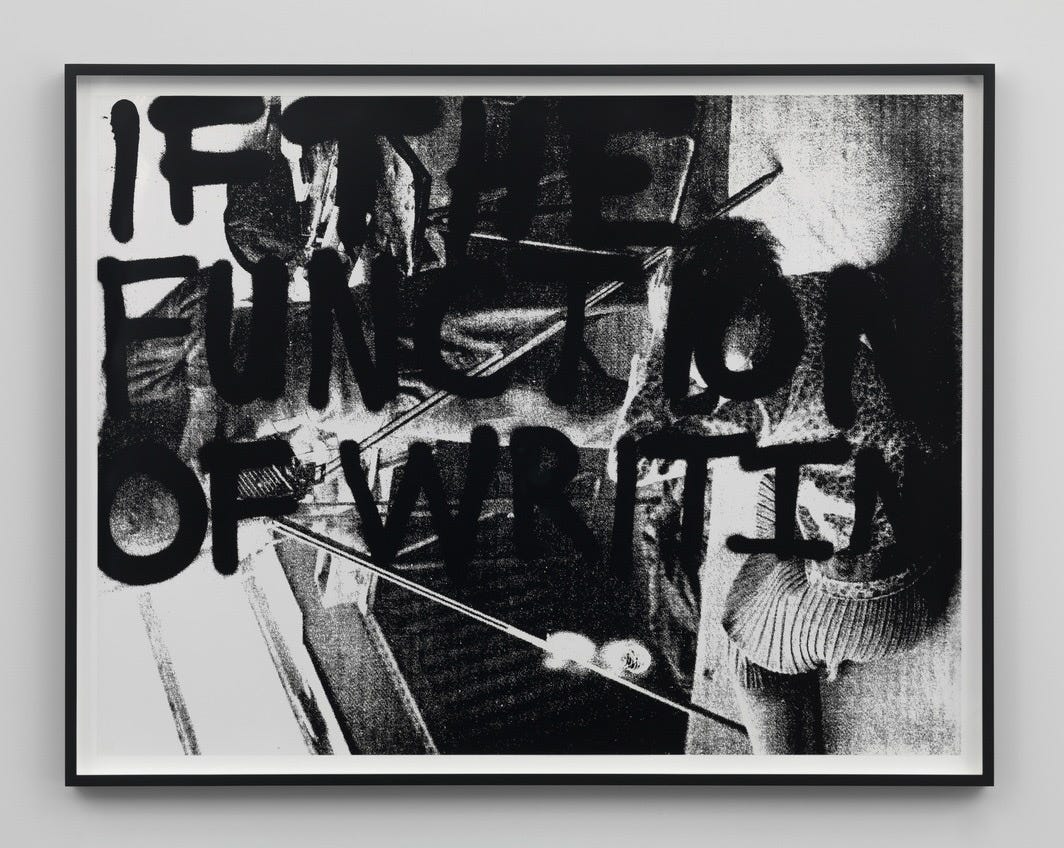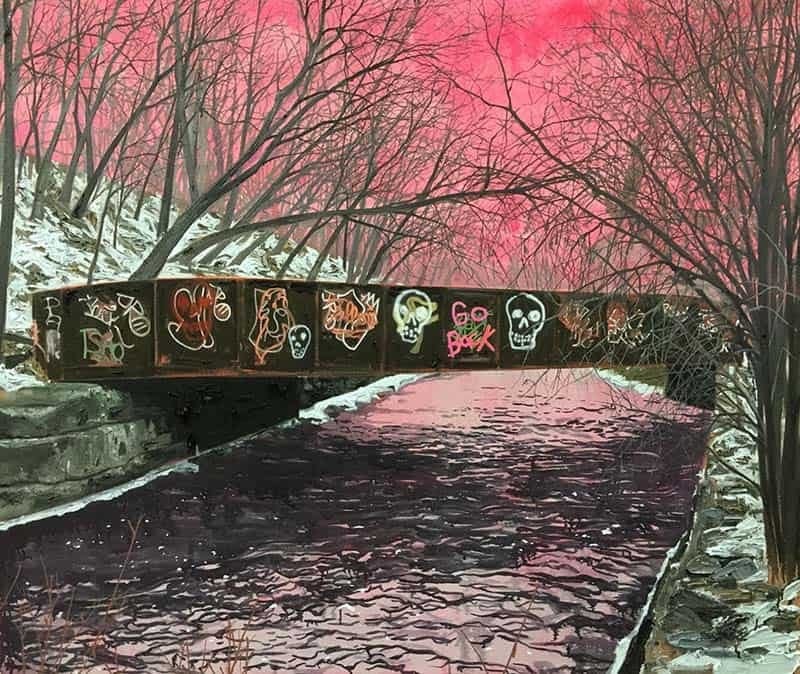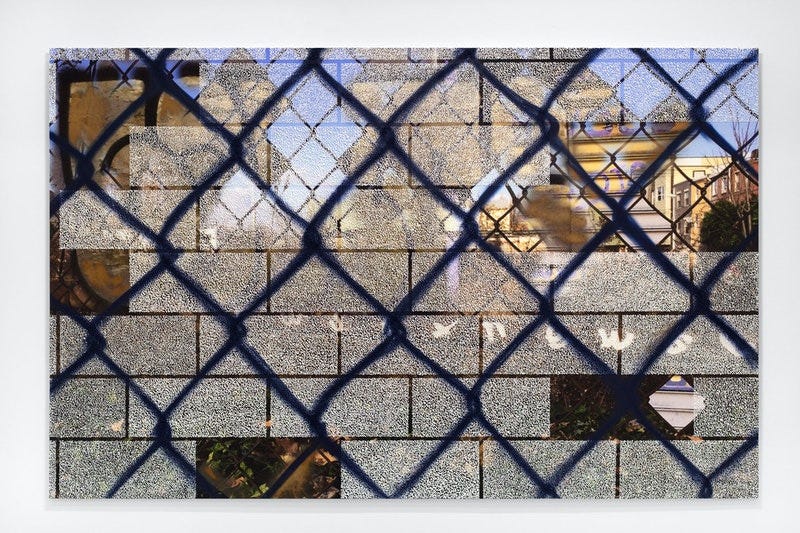There’s no knowing for sure how Eva and I met. To the best of our memory it was 2010 at the Cameron House, a downtown live music venue where our many friends in common liked to hang out. Over the years we’d occasionally run into each other, and we’d chat (and often argue) about writing and music. Sometimes she was my bartender. Later, during the pandemic, I sold her books curb-side through a plexiglass screen.
In 2022, I thought Eva was still living around the corner from me when I heard a rumour that she’d moved to New York and had written a film to be directed by Charlie Kaufman. That Charlie Kaufman? No shit. I looked into it, and the good news didn’t end there – Eva also stars in the film, and McLelland & Stewart was set to publish a new book of her poetry, The Natural Hustle.
Recently, I caught up with Eva over video link. We talked about neighbourhoods, translation, baseball, magical realism, and the visual art that inspires her writing. Our conversation has been edited for length and clarity.
— Josh
Why are the bookshelves behind you so empty?
Oh, I don't live here. Nobody lives here. I don't live anywhere.
Where are you?
I’m currently in a friend of a friend's apartment that nobody lives in.
In what neighbourhood of New York City?
That's a good question. It's in the nexus of a bunch of nonsense on the lower east side of Manhattan. You know when prices started being unliveable in Toronto, that was directly preceded by real estate agents naming the neighbourhoods weird shit nobody had ever heard of before, like “Brockton Village”? As soon as that showed up it was like –“fuck, let’s get out of here!” But I really liked living in Bushwick.
Is that in Brooklyn?
That’s in Brooklyn, yeah. The people are nice. Or, I don't know, maybe they're not nice. I just liked the good music — whenever some guy was driving down the road, it was always good music.
I love that when you say there's good music you don’t mean there's a bar like the Cameron House. No — the music’s good because the Bros in Jeeps barrelling down the street are playing something sweet.
Yeah! And music from the backyards and the people on the stoop. There's a lot of bachata in Bushwick, which I appreciate. And there’s a good variety. There's probably something like the Cameron House. I don't know what's like the Cameron House in New York. I do not know.
I only played one show in New York City. It was right before Hurricane Sandy in 2012. The venue was on the Lower East Side. After my show, I hopped on a Greyhound bus to Pittsburgh just to get the hell out of there, and Sandy flooded the venue and it never opened again. I think it closed for good the night after I played there.
Oh god, you shut it down. And you know it’s pissing rain right now as we speak.
So I think all the time about a conversation we had eons ago. This was possibly ten years ago. You recommended a book to me which, of course, I don't remember the title of, so I’d like to get it from you now. It was a French novel in which there’s a gang of kids who go around correcting people's grammar?
Yes! I love that book so much, L’Hiver De Force by Réjean Ducharme. I would love it if someone would give me some fucking money to translate that book. I would love to do it. The problem is, I don't know how to get the money. How do people do that? My guess is that those who translate are independently wealthy, because it doesn’t make any money. Or they get a grant – they went to university so they get a grant. Right?
I assume there are philanthropists who pay for what they’d like to have translated.
I think the Government of Canada will fork money over if you're highly educated, enough to come up with a blurb about yourself that sounds like you're at the vanguard of a performative political movement.
It wouldn’t surprise me if it’s hung up on higher education.
They might not ask if you’re educated but if you’re not highly educated, then how the fuck would you know how to write one of those things? It’s sneaky. People don’t necessarily develop those skills in their normal lives.
For example – you'll appreciate this – one time, I was sitting with some bartenders. I was with my friend who owns a few bars in Toronto and some other friends. We were at his house and the TV was on. And on the TV played an ad for a drink and it showed how to make it: “First you put the ICE in, then you put the GIN in, then you put in the tonic, and that’s how you make the perfect Gin & Tonic.” And the bartenders were all making fun of the ad, like, “What the fuck is this? How do you not know how to make a Gin & Tonic?” And I pointed out that if you don’t make drinks for a living, you might not know that you put the ice in first. There’s lots of people who haven’t worked in the service industry who wouldn’t know that you don’t fill up a drink and then put ice on top. So that’s an example of something that’s so self-evident to some and not to others. And I think the university people are like that with all their tricks. Like how to fill out forms.
So you're a doctor of Gin & Tonics. That’s what I’m hearing. [laughs]
What are you doing for the rest of your day?
I'm going to translate a poem by C.P. Cavafy because I love him. He’s a poet that never gets his due. I feel that the people who could like Cavafy don’t because he gets bad English translation.
That's interesting. What language does he write in?
He writes in modern Greek that has elements of archaic diction. He writes ultra sexy poems of gay desire with unmistakable gay sex imagery. But they’re always about simple stuff, like a mirror, for example. They’re usually about objects. And I feel he either gets this treatment in translation where they keep his simple sentence structure but they get rid of all the horniness, or they get rid of his simplicity to serve an Anglophone horniness.
It’s amazing to me that you can translate from all these different languages. I speak French, for example, but I couldn’t translate a novel.
Sure you could. I think you could. A lot of translators of poetry don’t seem to speak the language at all. I don’t really know how that works. Sometimes the translator will work with the author and they’ll collaborate, and you’ll say to the translator “Oh, you speak Ukrainian” and they say “No, I just translate Ukrainian poetry.” For certain books you need an exquisite grasp of the source language — Ulysses would be an example — but there are other works where a decent grasp of the source language and a solid understanding of the target language are more important. I don’t have the language skills to rewrite l’Hiver De Force in French, but I can certainly convey what it says in English, because I understand it.
It's different depending on which language you're going into versus coming out of. Haruki Murakami, for example, is a translator of English American literature to Japanese. He LOVES American Literature – he translates F. Scott Fitzgerald and all those hosers, but he doesn't translate his own books into English. Because that's a whole other thing. Because you have to be an English writer to do that.
We were introduced ages ago by mutual friends who are musicians. I assume that, similarly to me, you have the Toronto music scene to thank for many connections.
Yeah. I love musicians. They're very lovable people. When I was younger, I found the music community in Toronto, as far as arts communities go, was easily the most welcoming one. I just wanted to be around beauty and people who cared about words and gorgeous noises and making things. There’s something about musicians that’s either indiscriminate or proletarian, like they don't care. And I also think most musicians have not been formally schooled in their art. So they don't bring that attitude to it.
When will you next come visit us in Toronto?
That’s a great question. I don’t know. In their next issue, the West End Phoenix is publishing a Toronto Blue Jays-based poem that I wrote.
Sweet!
You should get a copy and draw a big heart.
What's it called?
It’s called Baseball On The Radio At Night. It’s based on something my friend Naomi said to me once. She’s presently a labour lawyer but was once a pro ballplayer in Japan. I was listening to the Jays when Jerry Howarth was still calling the games, which was the golden period. I love him so much and I love that he stopped using the Cleveland team name in 1992. Them and Atlanta, that was so cool. So he was calling this game and I was lying on the kitchen floor texting with my friend Naomi and she said “there’s nothing more exciting than baseball on the radio at night." It's so funny because it's ridiculous, but it's also true!
I agree.
Baseball is different every time. It hews less predictably to the plot than the average Hollywood film. There's quite a variety of outcomes.
I have to thank you for a recommendation you gave me, for a book of short stories by Chavisa Woods, called Things To Do When You’re Goth In the Country.
Oh my god! I know Chavisa. She’ll be so thrilled. You should become her friend. You would totally get along. She said something to me once about when her work was coming out, reviewers were calling it Magic Realism. And she was like, “No, no, no, it’s how I grew up in my town. I've put a few flourishes here and there, but it's pretty straight up what it's like.” That was funny, because that’s what South American writers say all the time — it's not magic realism, this is how we live.
That's really interesting. I was re-reading certain parts of your latest book of poems, The Natural Hustle, last night. Perhaps because I think I know a few of the people in it, but I found myself wanting to talk to the book, which was a very unique feeling for me.
Yeah, well, you should write your comments in the margins and take a picture of it. And I’ll write back. I always forget what's in the book but you certainly know some people in it. And it's full of all these places. It's got Roncesvalles. I feel like the Inter Steer Tavern is in it. And there's Trinity Bellwoods Park. It’s always popping off in that park. [Eva laughs] It makes me happy that my book has found a home with you.
The day following our interview, I reached out to Eva to see how she’d progressed in translating the Cavafy poem. She told me something had come up so she hadn’t gotten around to it, and instead sent me a Tragically Hip song she’d translated into French, for shits & giggles:
On a pris nos vélos, en roulant aussi vite que possible
T'as dit, “Pas de larmes, compris? Compris?”
J'ai dit, “D'accord”
Une foule naîtra, elle sera née mourante
Je veux veiller pour un signe dans la nuit
Ou voir une bombe exploser dans la vie d'une jeune fille
Qui es-tu?
La dernière recluse?
Qui es-tu?
La dernière bernache du Canada?
Qui-es tu?
Qu'est ce que t'as?
Qui es-tu? Qui es-tu?
Quand le vent se lève
la surface de l'eau brûle,
assez, assez
Un sifflet a crié,
t'as dit juste roule,
roule et ta gueule
J'ai sauté à bord,
me suis tourné pour te saluer
T'étais déjà sur ton vélo
En roulant avec mon vélo à côté
Qui es-tu,
le canoë noir?
Qui es-tu,
la dernière des intouchables?
Qui es-tu?
Tu as roulé hors de vue
Autant que j'ai pu voir que c'était toi
Tu as brisé mon cœur dès le début
M'a fallu travailler, travailler trop fort
Pour arriver là où j'en suis,
là où je te laisserai tout refaire
Qui es-tu? Qui es-tu?
Qu'est que je fais sans toi?
Qui es-tu, la dernière recluse?
Qui es-tu, la dernière des exonérées?
Es-tu le dernier canoë,
la dernière bernache du Canada?
Qui es-tu? Qui es-tu?
Qui es-tu? Qui es-tu?
Qui es-tu? Qui es-tu?
Qui es-tu?
You can watch Eva HD star in Charlie Kaufman’s film Jackals & Fireflies for free (the running time is 20min). And, as always, The Natural Hustle is available as my staff pick in-store at our Junction location and online.
Lastly, catch Eva’s poem in the April/May issue of the West End Phoenix. A subscription is $85 for the year, and readers of the Juncture can redeem the code THANKS15 to get 15% off.










